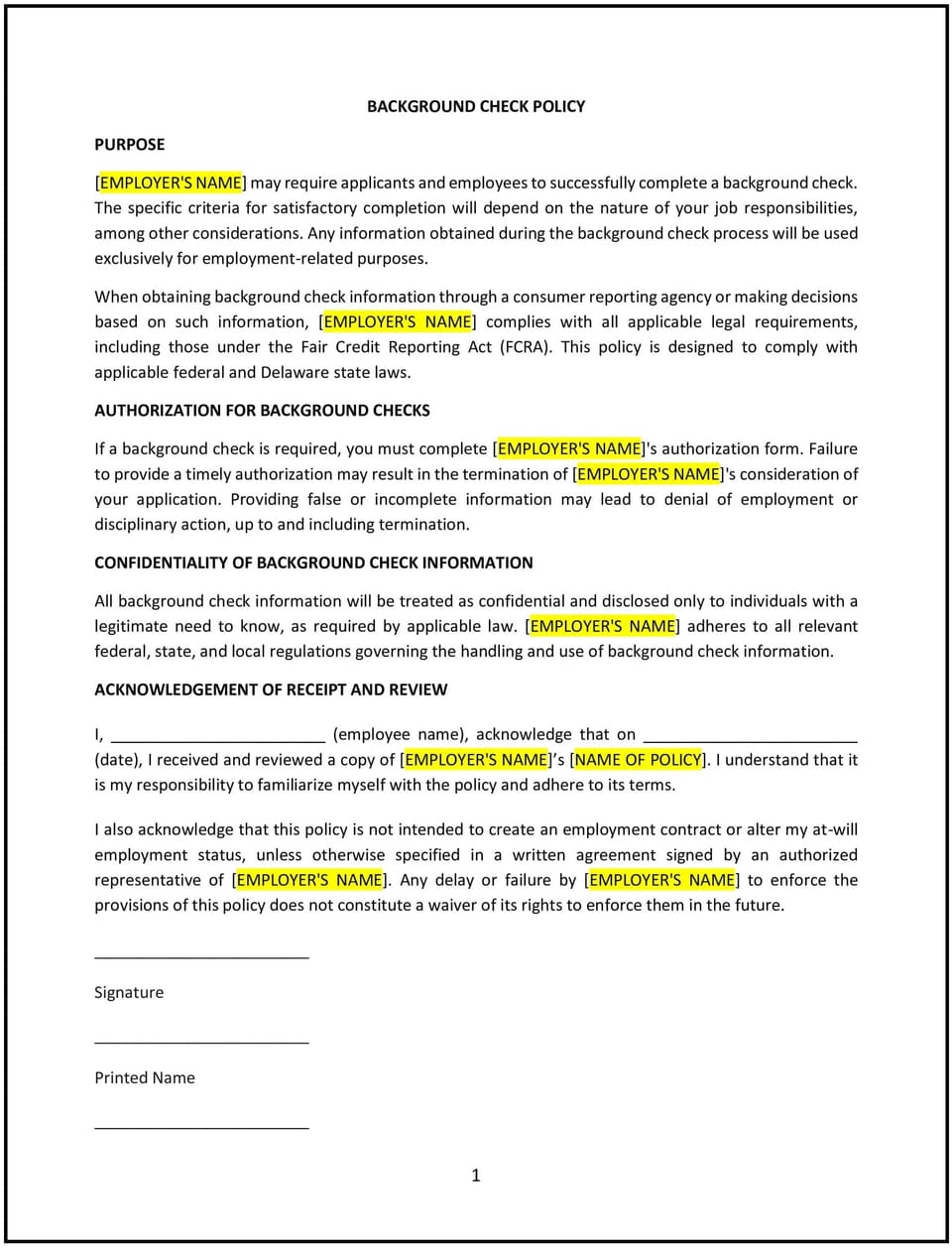Background check policy (Delaware): Free template

Background check policy (Delaware)
A background check policy helps Delaware businesses establish clear guidelines for conducting pre-employment background checks and verifying candidate qualifications. This policy outlines the types of checks performed, the process for obtaining candidate consent, and compliance with applicable laws, such as the Fair Credit Reporting Act (FCRA).
By implementing this policy, businesses can make informed hiring decisions, maintain a safe workplace, and ensure compliance with legal requirements.
How to use this background check policy (Delaware)
- Define the scope of checks: Specify the types of background checks conducted, such as criminal records, employment history, education verification, or credit checks, and their relevance to the role.
- Obtain candidate consent: Include procedures for obtaining written consent from candidates before performing any background checks, in compliance with the FCRA and Delaware laws.
- Ensure compliance: Follow all applicable federal and state regulations, including providing disclosures and handling candidate information securely.
- Establish decision criteria: Set clear standards for how background check results will influence hiring decisions, ensuring consistency and fairness.
- Communicate outcomes: Inform candidates of the results and provide them with an opportunity to dispute inaccuracies if adverse action is considered.
- Maintain confidentiality: Protect candidate information and limit access to authorized personnel only.
Benefits of using this background check policy (Delaware)
This policy offers several benefits for Delaware businesses:
- Improves hiring decisions: Provides reliable information to help employers verify qualifications and assess candidate suitability.
- Enhances workplace safety: Identifies potential risks by screening candidates for roles involving sensitive information or safety-critical tasks.
- Reduces liability: Ensures compliance with Delaware and federal regulations, minimizing legal risks associated with improper background checks.
- Promotes fairness: Establishes consistent criteria for evaluating background check results, reducing bias and ensuring equitable treatment.
- Protects candidate privacy: Safeguards sensitive information, fostering trust with candidates throughout the hiring process.
Tips for using this background check policy (Delaware)
- Communicate the policy clearly: Ensure candidates understand the types of checks performed, their purpose, and the process for obtaining consent.
- Follow legal requirements: Stay up-to-date with Delaware laws and federal regulations, including providing disclosures and adhering to adverse action procedures.
- Use checks relevant to the role: Limit background checks to those directly related to the job responsibilities to avoid unnecessary scrutiny.
- Review third-party vendors: If using external background check providers, ensure they comply with legal requirements and maintain data security.
- Regularly review the policy: Update the policy periodically to reflect changes in laws, industry practices, or organizational needs.
Q: Why is a background check policy important for my business?
A: A background check policy ensures consistent hiring practices, improves decision-making, and reduces legal risks by aligning with Delaware and federal regulations.
Q: What types of background checks can be included in this policy?
A: Common checks include criminal records, employment verification, education history, credit checks, and motor vehicle records. Employers should only conduct checks relevant to the job role.
Q: How should my business handle candidate consent?
A: Employers must obtain written consent from candidates before conducting any background checks. The policy should outline the consent process and comply with FCRA and Delaware laws.
Q: What should I do if adverse action is needed based on a background check?
A: The policy should include steps for notifying candidates of adverse action, providing them with the report, and allowing them to dispute inaccuracies, as required by law.
Q: How often should this policy be reviewed?
A: Review the policy annually or whenever Delaware laws or federal regulations change to ensure continued compliance and effectiveness.
This article contains general legal information and does not contain legal advice. Cobrief is not a law firm or a substitute for an attorney or law firm. The law is complex and changes often. For legal advice, please ask a lawyer.


